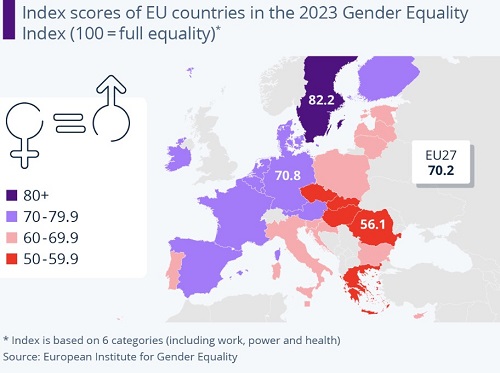March 8, 2024: equality men-women in Europe is still far away, especially in Italy where Prime Minister Giorgia Meloni is just an exception
TORONTO – Today is Women’s Day, but what is the condition of women, in the world and especially in Europe and in Italy? According to the most recent data available, there are still many social, economic and cultural emergencies affecting women.
In Europe, for example, the Gender Equality Index 2023 of the European Institute for Gender Equality shows that there is still a long way to go.
The index is based on the performance of EU countries in six categories: work, money, education, time, power and health. The graph (above) developed by Statista and published by Money.it, is very clear in this regard: while Sweden is at the top of the gender equality ranking, the average value of the index for the entire Union shows how slowly development is proceeding. And Italy, in particular, seems particularly behind along with Portugal and other countries and in any case below Spain, France and Germany which prove to be more advanced.
In its focus on Italy and the world of work, the European Institute for Gender Equality highlights, in the data collected for 2023, shows that there is still no equality for women in the way they are inserted into the world of work. These are the data:
full-time employment rate (%, population 15-89): women 31%, men 51%;
duration of working life (years, population from +15): women 27, men 36;
career prospects index (points, 0-100, +15 population): women 52, men 56.
It should be underlined that in all three parameters considered, the Italian figure relating to the female world is lower than the European average.
As for women’s salaries in Italy, according to the Italian INPS Observatory, in 2022 women earned 8,000 euros less gross than men in the private sector. And according to the survey by the consultancy company Odm Consulting, in the first 9 months of 2023 the gender gap in wages (i.e. the difference between male and female pay) stood at 10.7%, in line with what was recorded in the previous year. The gap therefore exists and is persistent.
Consequently, it is women’s economic independence that suffers, which is very distant for one in two between 15 and 64 years old.
It is also interesting to read the data relating to the sectors in which women are mostly employed. In them, in fact, we can read a real female segregation. According to the International Standard Classification of Occupations, in the third quarter of 2023 in the EU women constitute the vast majority of people employed in specific professions: teacher assistants 92.6%; secretaries 89.3%; primary school and early childhood teachers 88.2%; nursing and midwifery professionals 87.5%; domestic, hotel and office helpers and helpers 86.5%.
In Italy, among people employed in education, health and social assistance activities (%, 15-89 employed), the European Institute for Gender Equality highlighted that in 2023 27% were women and only 7% men.
As Money.it writes, “behind these figures are hidden cultural prejudices that conceive women as the only ones suitable to cover roles related to care, teaching, care and assistance (stereotypical and obsolete image of the female housewife and teacher). It is no coincidence that today we are talking about an emergency linked to the significant under-representation of women in the so-called STEM (Science, Technology, Engineering and Mathematics) studies and sectors”.
Gender equality in decision-making positions throughout the political, economic and social sphere highlights that women are still in the minority, despite Italy currently having a female Prime Minister for the first time in its history: Giorgia Meloni. In Italy, according to data processed by the European Institute for Gender Equality for 2023, the gaps were calculated as follows: share of ministers 24% women, 76% men; share of members of Parliament 33% women, 67% men; share of members of regional assemblies/local municipalities 24% women, 66% men. The leader of Fratelli d’Italia, therefore, represents a real exception.
What about women who don’t work or are not involved in politics? The European Institute for Gender Equality has collected the following data for 2023:
– people who care for and educate their children or grandchildren, elderly people or people with disabilities, every day: 34% women, 25% men;
– people who cook and/or do housework every day: 72% women; 34% men;
– workers who carry out sporting, cultural or recreational activities outside the home, at least daily or several times a week: 28% women, 34% men;
– workers involved in voluntary or charitable activities, at least once a month: 11% women, 13% men.
In conclusion: equality between men and women is one of the unresolved achievements of our time. In every area, the female world is penalized by stereotypes, ignorance, social, political and cultural involution.
ITALIAN VERSION: 8 Marzo 2024: la parità uomo-donna è ancora lontana, soprattutto in Italia dove la premier Giorgia Meloni è un’eccezione



